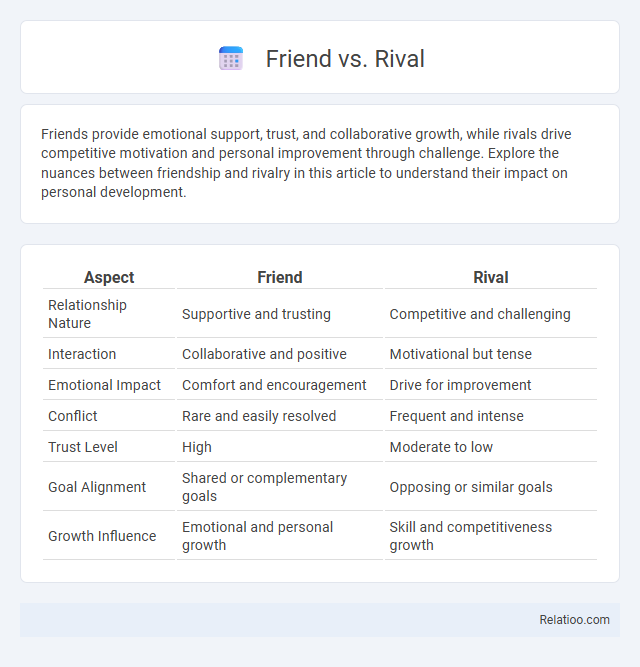Friends provide emotional support, trust, and collaborative growth, while rivals drive competitive motivation and personal improvement through challenge. Explore the nuances between friendship and rivalry in this article to understand their impact on personal development.
Table of Comparison
| Aspect | Friend | Rival |
|---|---|---|
| Relationship Nature | Supportive and trusting | Competitive and challenging |
| Interaction | Collaborative and positive | Motivational but tense |
| Emotional Impact | Comfort and encouragement | Drive for improvement |
| Conflict | Rare and easily resolved | Frequent and intense |
| Trust Level | High | Moderate to low |
| Goal Alignment | Shared or complementary goals | Opposing or similar goals |
| Growth Influence | Emotional and personal growth | Skill and competitiveness growth |
Understanding the Concepts: Friend vs Rival
Understanding the concepts of Friend vs Rival reveals contrasting dynamics that shape your social interactions and personal growth. A friend supports and collaborates with you, fostering trust and mutual encouragement, while a rival challenges your abilities, pushing you to improve through competition and ambition. Recognizing these roles helps you balance relationships that contribute to both emotional support and motivational drive.
Key Differences Between Friends and Rivals
Friends share trust, mutual support, and positive emotional connections, fostering collaboration and personal growth. Rivals, however, are characterized by competition, opposing goals, and a drive to outperform each other, often fueling motivation through challenge. The key difference lies in the foundation of relationships: friends prioritize cooperation and empathy, while rivals emphasize competition and achievement.
The Psychology Behind Friendship and Rivalry
Friendship and rivalry engage distinct psychological processes influencing social dynamics and personal growth. Friendships are grounded in trust, empathy, and mutual support, fostering emotional bonding and enhancing well-being. Rivalries activate competitive drive and self-improvement motives, often stimulating cognitive focus and resilience, but can trigger stress and conflict when perceived as threats.
How Rivalries Shape Personal Growth
Rivalries drive personal growth by motivating you to push beyond your limits and hone your skills through continuous challenge. Friends provide support and encouragement, but a rival's competitive nature sparks resilience and determination essential for self-improvement. This dynamic fosters a balanced development of confidence, discipline, and emotional strength.
Benefits of Having Friends and Rivals
Friends provide emotional support, boost your mental health, and foster collaboration, enhancing your personal growth and happiness. Rivals stimulate motivation, drive you to improve skills, and encourage healthy competition, pushing you to achieve higher goals. Balancing both friends and rivals in your life creates a dynamic environment where you can learn, grow, and excel.
Signs Your Friend is Becoming a Rival
Shifts in behavior such as increased competitiveness, frequent disagreements, and a decline in supportive communication are key signs your friend may be becoming a rival. Noticeable changes in body language, like avoiding eye contact or crossed arms, often indicate underlying tension. When once cooperative interactions turn into challenges over opinions or achievements, it signals the transformation from friendship to rivalry.
Turning Rivalries into Healthy Competition
Turning rivalries into healthy competition transforms conflict into motivation, encouraging personal growth and mutual respect. You can foster this by focusing on shared goals, open communication, and recognizing each other's strengths rather than viewing rivals as adversaries. Emphasizing collaboration over confrontation helps maintain friendships while fueling ambition in competitive environments.
Balancing Friendships and Rivalries in Life
Balancing friendships and rivalries requires recognizing that both can drive your personal growth by offering support and healthy competition. Friendships provide emotional stability and trust, while rivalries challenge you to improve skills and achieve goals through constructive motivation. You can cultivate a harmonious life by setting clear boundaries and valuing the unique role each relationship plays in shaping your character and success.
Real-Life Examples: Friends Who Became Rivals
Friendships often evolve into rivalries when shared goals or ambitions create competition, as seen in the famous real-life example of Steve Jobs and Steve Wozniak, whose partnership at Apple eventually faced tensions over vision and control. You may experience a similar dynamic in your personal or professional life, where trust is tested by conflicting interests and ambitions. Understanding these transitions helps manage relationships and maintain respect despite rivalry.
Choosing Trust: Navigating Between Friendship and Rivalry
Choosing trust between a friend and a rival requires careful evaluation of loyalty, intentions, and past experiences to maintain healthy relationships. Your ability to discern genuine support from competitive tension is crucial for effective communication and emotional balance. Balancing these dynamics ensures strategic alliances while protecting yourself from potential betrayal.

Infographic: Friend vs Rival
 relatioo.com
relatioo.com